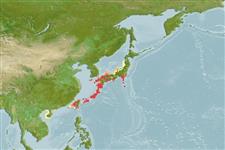>
Acropomatiformes (Oceanic basses) >
Creediidae (Sandburrowers)
Etymology: Creedia: Greek, kreesi, kreas = somebody that receives or keeps flesh (Ref. 45335); bilineata: Named in reference to the two stripes on the body..
Environment: milieu / climate zone / depth range / distribution range
ນິເວດວິທະຍາ
ສັດທະເລ ອາໄສຢູ່ໃກ້ໜ້າດິນໃຕ້ພື້ນທ້ອງນ້ຳ; ລະດັບຄວາມເລິກ 3 - 5 m (Ref. 12706). Subtropical
Northwest Pacific: Japan.
ຂະໜາດ / ນ້ຳໜັກ / Age
Maturity: Lm ? range ? - ? cm
Max length : 3.2 cm SL ຕົວຜູ້/ບໍ່ມີເພດ; (Ref. 12706)
Short description
ຕົວທີ່ໃຊ້ໃນການຈຳແນກຊະນິດ | ສະລີລະວິທະຍາ | ການວັດແທກຮູບຮ່າງລັກສະນະພາຍນອກຂອງດິນ,ສັດ,ປາ…
ຄີຫຼັງຂອງປາ (ຄີອ່ອນ) (ທັງໝົດ) : 15 - 16; ຄີກົ້ນຂອງປາ: 17 - 18; ສັດທີ່ມີກະດູກສັນຫຼັງ: 42. Epurals 2; body with two yellowish brown stripes in life (Ref. 12706).
Found on shallow sandy bottom (Ref. 12706). Observed to abruptly rush out of the sand and immediately dive into nearby when disturbed (Ref. 12706).
Life cycle and mating behavior
Maturities | ການສືບພັນ | Spawnings | Egg(s) | Fecundities | ຕົວອ່ອນ
Shimada, K. and T. Yoshino, 1987. A new creediid fish Creedia bilineatus from the Yaeyama Islands, Japan. Jap. J. Ichthyol. 34(2):123-127. (Ref. 12706)
IUCN Red List Status (Ref. 130435)
Threat to humans
Harmless
Human uses
ເຄື່ອງມື
Special reports
Download XML
ແຫຼ່ງອີນເຕີເນັດ
Estimates based on models
Preferred temperature (Ref.
123201): 20.5 - 26.3, mean 23.5 °C (based on 109 cells).
Phylogenetic diversity index (Ref.
82804): PD
50 = 0.5625 [Uniqueness, from 0.5 = low to 2.0 = high].
Bayesian length-weight: a=0.00102 (0.00046 - 0.00225), b=3.06 (2.88 - 3.24), in cm total length, based on all LWR estimates for this body shape (Ref.
93245).
ຊັ້ນເຂດຮ້ອນ (Ref.
69278): 3.1 ±0.4 se; based on size and trophs of closest relatives
Fishing Vulnerability (Ref.
59153): Low vulnerability (10 of 100).
